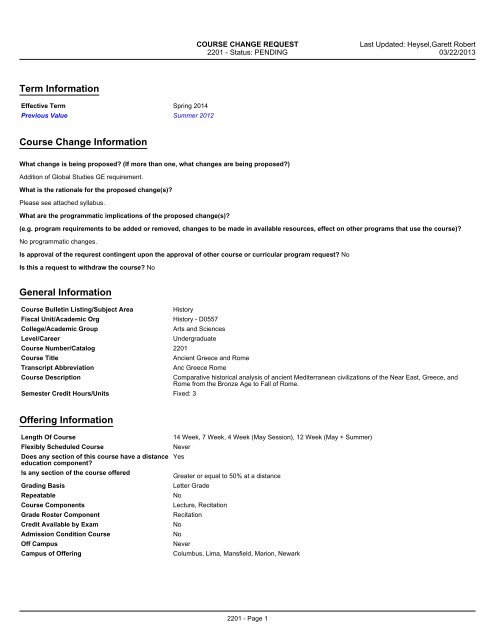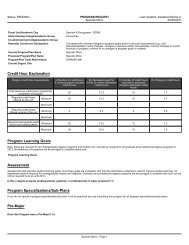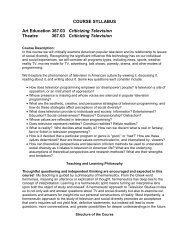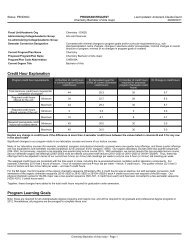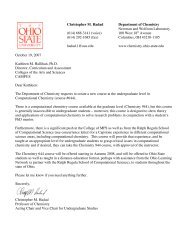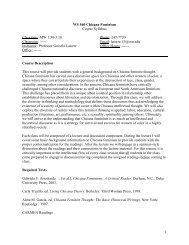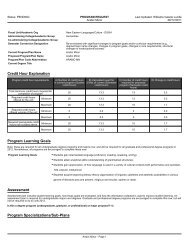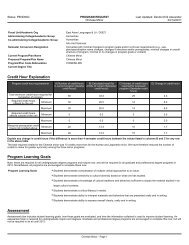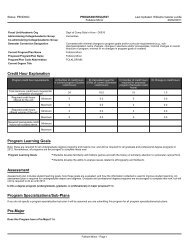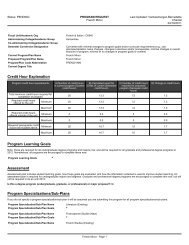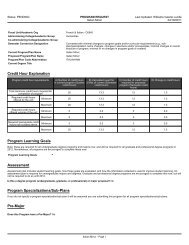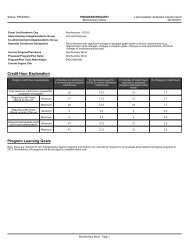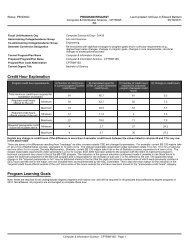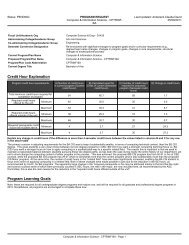History 2201 Course Change.pdf - The Ohio State University
History 2201 Course Change.pdf - The Ohio State University
History 2201 Course Change.pdf - The Ohio State University
Create successful ePaper yourself
Turn your PDF publications into a flip-book with our unique Google optimized e-Paper software.
COURSE CHANGE REQUEST<br />
<strong>2201</strong> - Status: PENDING<br />
Last Updated: Heysel,Garett Robert<br />
03/22/2013<br />
Term Information<br />
Effective Term Spring 2014<br />
Previous Value Summer 2012<br />
<strong>Course</strong> <strong>Change</strong> Information<br />
What change is being proposed? (If more than one, what changes are being proposed?)<br />
Addition of Global Studies GE requirement.<br />
What is the rationale for the proposed change(s)?<br />
Please see attached syllabus.<br />
What are the programmatic implications of the proposed change(s)?<br />
(e.g. program requirements to be added or removed, changes to be made in available resources, effect on other programs that use the course)?<br />
No programmatic changes.<br />
Is approval of the requrest contingent upon the approval of other course or curricular program request? No<br />
Is this a request to withdraw the course? No<br />
General Information<br />
<strong>Course</strong> Bulletin Listing/Subject Area<br />
Fiscal Unit/Academic Org<br />
College/Academic Group<br />
Level/Career<br />
<strong>History</strong><br />
<strong>Course</strong> Number/Catalog <strong>2201</strong><br />
<strong>Course</strong> Title<br />
Transcript Abbreviation<br />
<strong>Course</strong> Description<br />
<strong>History</strong> - D0557<br />
Arts and Sciences<br />
Undergraduate<br />
Semester Credit Hours/Units Fixed: 3<br />
Ancient Greece and Rome<br />
Anc Greece Rome<br />
Comparative historical analysis of ancient Mediterranean civilizations of the Near East, Greece, and<br />
Rome from the Bronze Age to Fall of Rome.<br />
Offering Information<br />
Length Of <strong>Course</strong><br />
Flexibly Scheduled <strong>Course</strong><br />
Does any section of this course have a distance<br />
education component?<br />
Is any section of the course offered<br />
Grading Basis<br />
Repeatable<br />
<strong>Course</strong> Components<br />
Grade Roster Component<br />
Credit Available by Exam<br />
Admission Condition <strong>Course</strong><br />
Off Campus<br />
Campus of Offering<br />
14 Week, 7 Week, 4 Week (May Session), 12 Week (May + Summer)<br />
Never<br />
Yes<br />
Greater or equal to 50% at a distance<br />
Letter Grade<br />
No<br />
Lecture, Recitation<br />
Recitation<br />
No<br />
No<br />
Never<br />
Columbus, Lima, Mansfield, Marion, Newark<br />
<strong>2201</strong> - Page 1
COURSE CHANGE REQUEST<br />
<strong>2201</strong> - Status: PENDING<br />
Last Updated: Heysel,Garett Robert<br />
03/22/2013<br />
Prerequisites and Exclusions<br />
Prerequisites/Corequisites<br />
Prereq or concur: English 1110.xx, or permission of instructor.<br />
Previous Value<br />
Prereq or concur: English 1110.xx.<br />
Exclusions Not open to students with credit for 1211 or 301.<br />
Cross-Listings<br />
Cross-Listings<br />
Subject/CIP Code<br />
Subject/CIP Code 54.0103<br />
Subsidy Level<br />
Baccalaureate <strong>Course</strong><br />
Intended Rank<br />
Freshman, Sophomore, Junior<br />
Quarters to Semesters<br />
Quarters to Semesters Semester equivalent of a quarter course (e.g., a 5 credit hour course under quarters which becomes a 3<br />
credit hour course under semesters)<br />
List the number and title of current course<br />
being converted<br />
<strong>History</strong> 301: Introduction to Ancient Mediterranean Civilizations.<br />
Requirement/Elective Designation<br />
Required for this unit's degrees, majors, and/or minors<br />
General Education course:<br />
Historical Study; Global Studies (International Issues successors)<br />
<strong>The</strong> course is an elective (for this or other units) or is a service course for other units<br />
Previous Value<br />
Required for this unit's degrees, majors, and/or minors<br />
General Education course:<br />
Historical Study<br />
<strong>The</strong> course is an elective (for this or other units) or is a service course for other units<br />
<strong>Course</strong> Details<br />
<strong>Course</strong> goals or learning<br />
objectives/outcomes<br />
Content Topic List<br />
<strong>State</strong> formation<br />
•<br />
• Social development and structure with special emphasis on Greek and Roman societies<br />
• <strong>The</strong> economy<br />
• Urbanism<br />
• Empires<br />
• Diplomacy and military conflict<br />
• Literature<br />
• <strong>The</strong> arts<br />
<strong>2201</strong> - Page 2
COURSE CHANGE REQUEST<br />
<strong>2201</strong> - Status: PENDING<br />
Last Updated: Heysel,Garett Robert<br />
03/22/2013<br />
Attachments<br />
• <strong>History</strong> Assessment plan.doc<br />
(GEC <strong>Course</strong> Assessment Plan. Owner: Roth,Randolph Anthony)<br />
•<br />
<strong>History</strong> <strong>2201</strong> Ancient Greece and Rome Tim Gregory with rationale.docx<br />
(Syllabus. Owner: Roth,Randolph Anthony)<br />
Comments<br />
• See 11-6-12 e-mail to N. Breyfogle. (by Vankeerbergen,Bernadette Chantal on 11/06/2012 11:28 AM)<br />
Workflow Information<br />
Status User(s) Date/Time Step<br />
Submitted Roth,Randolph Anthony 10/29/2012 10:17 AM Submitted for Approval<br />
Approved Roth,Randolph Anthony 10/29/2012 10:47 AM Unit Approval<br />
Approved Heysel,Garett Robert 10/30/2012 08:50 PM College Approval<br />
Revision Requested<br />
Vankeerbergen,Bernadet<br />
te Chantal<br />
11/06/2012 11:29 AM ASCCAO Approval<br />
Submitted Roth,Randolph Anthony 02/28/2013 10:45 PM Submitted for Approval<br />
Approved Roth,Randolph Anthony 02/28/2013 10:45 PM Unit Approval<br />
Approved Heysel,Garett Robert 03/22/2013 03:21 PM College Approval<br />
Pending Approval<br />
Nolen,Dawn<br />
Jenkins,Mary Ellen Bigler<br />
Vankeerbergen,Bernadet<br />
te Chantal<br />
Hogle,Danielle Nicole<br />
Hanlin,Deborah Kay<br />
03/22/2013 03:21 PM ASCCAO Approval<br />
<strong>2201</strong> - Page 3
<strong>History</strong> <strong>2201</strong><br />
Ancient Greece and Rome:<br />
Introduction to Ancient Mediterranean<br />
Civilizations<br />
Autumn Semester 2012<br />
<strong>Course</strong> Catalog Listing:<br />
Comparative historical analysis of ancient Mediterranean civilizations: emphasis on Greek and<br />
Roman societies, urbanism, empires, literature, arts; from the Bronze Age to Fall of Rome.<br />
Class Description:<br />
This class is an introduction to the history of the Ancient Mediterranean Civilizations of Greece<br />
and Rome. It provides a background of the chronological development of ancient Greek and<br />
Roman civilizations and then focuses on the broad issues of state-formation, politics, gender,<br />
warfare, tyranny, monotheism, and the environment over a period of some two thousand years,<br />
allowing students the opportunity to deal with these issues in several historical contexts over the<br />
whole of the course. <strong>The</strong> course concludes with a consideration of the importance of Greek and<br />
Roman history in the modern world and the ways in which it is perceived and used today.<br />
Enrollment:<br />
All students must be officially enrolled in the course by the end of the second full week of the<br />
semester. No requests to add the course will be approved by the Chair after that time. Enrolling<br />
officially and on time is solely the responsibility of the student.<br />
Instructor:<br />
Professor Timothy E. Gregory, 338 Dulles Hall. 292-1949, gregory.4@osu.edu. Office hours:<br />
Monday 11:30 AM to 1:30 PM, and by appointment; online at most hours.<br />
Teaching Associates:<br />
Brendan McCarthy (mccarthy.351@osu.edu)<br />
Carole Mitchell (mitchell.703@osu.edu)<br />
Kyle Shimoda (shimoda.4@osu.edu)<br />
Kyle Tadlock (tadlock.6@osu.edu)<br />
Required Book: D.B. Nagle, <strong>The</strong> Ancient World: A Social and Cultural <strong>History</strong>, 7 th edition,<br />
Pearson: ISBN 9780205637447. This book has been ordered through SBX, but it will probably<br />
be available at other bookstores as well and online. Much of the material for the quizzes and<br />
exams will be taken from this book, so you will need to have the book and read it regularly. We<br />
strongly recommend that you purchase the 7 th (newest) edition of the book, but you may be able<br />
to “get away” with using an older edition; you will, however, be responsible for the information<br />
in the 7 th edition and if you get something “wrong” as a result of using on older edition, you<br />
1
cannot claim that you were misled by having an out-of-date textbook. <strong>The</strong> assignments in Nagle<br />
will be given by chapter, rather than by page, so you can easily know what the assignment is,<br />
even in an older book.<br />
Besides the reading in the textbook, you will also be expected to read other online texts that will<br />
be provided on this site each week.<br />
Necessary Software:<br />
If you don't already have them (most computers will) you will need to install recent versions of<br />
three programs on your computer.<br />
1. Adobe Acrobat Reader. Can be downloaded for free at<br />
http://www.adobe.com/products/acrobat/readstep2.html<br />
2. Real Player (most recent version). Can downloaded for free (click on name).<br />
3. Adobe Flash (most recent version).<br />
Please note that if you will be working from someone else's computer, these programs might not<br />
be installed. Also, please note that for videos in Real Player you cannot use some other multimedia<br />
player (like Windows Media Player)--only Real Player or Flash will work for some of the<br />
videos.<br />
Also, since some students in the past have had difficulty downloading and using some of the<br />
online videos and audio files, we have created a “Videos and Audio” page in the <strong>Course</strong><br />
Overview area with suggestions for accessing the videos and audio files; we will keep this page<br />
up-dated and think it will answer most of your questions about this issue, at least as far as our<br />
knowledge allows.<br />
________________________________________________________________________<br />
Discussion Groups and Group Leaders:<br />
<strong>The</strong> following are the Discussion Groups, along with the names of the Discussion Leaders:<br />
Alexandrians (Timothy Gregory)<br />
Corinthians (discussion leader: Brendan McCarthy)<br />
Pompeians (discussion leader: Carole Mitchell)<br />
Romans (discussion leader: Kyle Shimoda)<br />
Spartans (discussion leader: Kyle Tadlock)<br />
Your discussion leader is responsible for grading all your assignments, so you need to talk with<br />
him/her about any questions you have concerning your grades.<br />
Your discussion leader will send you a message telling you what group you are in, but you can<br />
also find out which group that is by looking at the Discussions area and then scan down to the<br />
Student Forum area, and your group will be right below that. One other way to tell what group<br />
you are in is to go to the Classlist tab at the top right of the Carmen page and look for your own<br />
name; then look to the right and you will see a small ikon that looks like two small heads; that is<br />
the “groups” button: click on it and it will tell you which group you are in.<br />
2
Class Format:<br />
<strong>The</strong> course will operate entirely online; there are no regular class meetings and all assignments<br />
are turned in through Carmen. <strong>The</strong>re is also regular, required, online discussion (which you can<br />
participate at any time throughout each week). It is your responsibility to understand the<br />
requirements for the class by reading carefully all the assigned material in the "<strong>Course</strong><br />
Overview" section of the "Content" area of the class. You are also responsible for meeting all<br />
assignment deadlines.<br />
Historical Study<br />
Goals:<br />
Students recognize how past events are studied and how they influence today’s society and the<br />
human condition.<br />
Expected Learning Outcomes:<br />
1. Students construct an integrated perspective on history and the factors that shape human<br />
activity.<br />
2. Students describe and analyze the origins and nature of contemporary issues.<br />
3. Students speak and write critically about primary and secondary historical sources by examining<br />
diverse interpretations of past events and ideas in their historical contexts.<br />
Rationale for fulfilling the GE Learning Outcomes for Historical Study:<br />
Goals of the course that fulfill the GE Learning Outcomes in Historical Study:<br />
<strong>History</strong> courses develop students’ knowledge of how past events influence today’s society and<br />
help them understand how humans view themselves through the following ways:<br />
1. Critically examine theories of history and historical methodologies. <strong>The</strong>ories of <strong>History</strong>:<br />
Students will be introduced to most of the major theories of history and historical change, many<br />
of which were developed by the historians of the ancient world. <strong>The</strong>se will include mythic views<br />
of history, in which events are controlled by gods or similar figures; Herodotus’ view that<br />
historical phenomena are the result of human action; Thucydides’ idea that historical events are<br />
caused by deep-seated psychological and political structures, and Polybius’ view of recurring<br />
circles of political change. Historical Methods: <strong>The</strong> course combines a topically inclusive<br />
broad vision of the Ancient World of the Near East and the Mediterranean basin over a period of<br />
4000 years with and a consciously comparative approach that examines how their political,<br />
social, economic, and environmental institutions compare and contrast with each other.<br />
2. Engage with contemporary and historical debates on specific regions, time periods and<br />
themes of the human past. Historical debates: <strong>The</strong> course will study debates over the causes of<br />
the emergence of civilization around 3500 B.C. and the development of theocratic monarchies in<br />
the ancient Near East, the emergence of systematic rational thought and democracy in ancient<br />
3
Greece, and the culmination of that with Alexander the Great’s creation of one of the first “world<br />
empires” and the broad social and legal changes (including an enlarged opportunity for women<br />
to have political and economic power), and causes for the rise, dominance, and ultimate fall of<br />
the Roman Empire. Contemporary debates: <strong>The</strong> course will examine such contemporary debates<br />
as the relationships between religion and rationalism, the advantages and disadvantages of<br />
democracy, the role of the environment and its wise and/or unwise utilization over a vast sweep<br />
of time, and the ways in which past societies have developed very different systems of economic<br />
development.<br />
3. Through reading in primary and secondary sources and in-depth class discussion, students<br />
will access and critically examine social, political, economic, military, gender, religious, ecological,<br />
and ethnic/racial/national movements in a wider socio-cultural context. <strong>The</strong> course presents<br />
students with a variety of sources, mainly written, but also including material culture (in this case<br />
mainly archaeological sites and artifacts), maps, videos, and images, and asks them to analyze<br />
how the sources of different types illustrate the themes of the course. <strong>The</strong> course has been designed<br />
to take a “whole history” approach, including politics, economics, society, and culture.<br />
<strong>The</strong>se four themes and an emphasis on how the study of the ancient past can help us better approach<br />
the problems and issues of today’s world.<br />
4. Although some graded assignments of the course are required (a series of quizzes and weekly<br />
discussion), other assignments can be selected from a list of other possibilities, including<br />
examinations and short, focused papers. All of these assignments will contain a significant<br />
analytic portion that requires detailed analysis and written exposition.<br />
Diversity<br />
Goals:<br />
Students understand the pluralistic nature of institutions, society, and culture in the United <strong>State</strong>s<br />
and across the world in order to become educated, productive, and principled citizens.<br />
Expected Learning Outcomes:<br />
Global Studies<br />
1. Students understand some of the political, economic, cultural, physical, social, and philosophical<br />
aspects of one or more of the world's nations, peoples and cultures outside the<br />
U.S.<br />
2. Students recognize the role of national and international diversity in shaping their own attitudes<br />
and values as global citizens.<br />
Rationale for fulfilling the GE Learning Outcomes for Global Studies:<br />
Goals of the course that fulfill the GE Learning Outcomes in Global Studies:<br />
<strong>History</strong> courses develop students’ knowledge of how past events influence today’s society and<br />
help them understand how humans view themselves through the following ways:<br />
4
1. Through reading in primary and secondary sources and in-depth class discussion, students<br />
critically examine the political, economic, social, cultural and philosophical development<br />
of the ancient world and how many (if not most) of the political institutions, religious<br />
and intellectual structures, and social attitudes had their origins in this period. In<br />
addition, the course will allow us to focus on questions of diversity, inclusion/exclusion,<br />
gender, and social and economic fairness and harmony in an ancient world that is chronologically<br />
very remote for our own but where the issues that were being debated are essentially<br />
the same as those that confront contemporary society.<br />
2. Engage with contemporary and historical debates on the differences and similarities between<br />
cultures and peoples. <strong>The</strong>se will include issues such as racism, gender, toleration,<br />
and changes in attitudes toward them over time.<br />
3. Access and critically examine ethnically, nationally or religiously framed movements in a<br />
wider socio-cultural and global context. All the materials in the course were selected to<br />
do this.<br />
4. Carry out in-depth analysis in papers and/or essays in written exams, comparing distinct<br />
moments in human history and how they shaped the world in the past and today. In their<br />
papers and in exam essays, the students analyze specific moments or issues in terms of<br />
their local and their global significance.<br />
5. Completing readings, attending lectures, and participating in class discussions and assignments<br />
that will help students understand the complexity of debates over international<br />
issues. Students will describe theories of inter-group issues on exams and written assignments.<br />
6. Students will understand the roots and structures of today’s globalized world.<br />
Class Organization Quiz and Beginning of Class Survey:<br />
It is a requirement of this class that all enrolled students take and pass a quiz to demonstrate their<br />
understanding of the organization of the class. This quiz can be found in the Quiz area of the<br />
class and the 10 multiple-choice questions on it are drawn from the syllabus and the material in<br />
the <strong>Course</strong> Overview area of Content in the class. You must pass this quiz with a score of 80%<br />
or more no later than September 9. You can take the quiz as many times as you like until you<br />
get 80% (but be advised that the questions are randomized from a larger question bank and you<br />
will not get the same questions each time you take the quiz). Another requirement of the class<br />
is that you take a Beginning of Class Survey, also no later than September 9. <strong>The</strong> survey is<br />
simple and quick and it is designed simply to tell us something about the students taking this<br />
class. You will find the survey in the Surveys tab at the top center of the Carmen class page.<br />
Discussion:<br />
Much of the work in the class is conducted in online discussion groups. Each of you has been<br />
placed into an individual discussion group, which will be guided by one of the Discussion<br />
Leaders (see above). Consult the Discussion page in the <strong>Course</strong> Overview for more information<br />
about how the graded discussion operates and how the grade is determined. You can see which<br />
discussion group you are in by looking at the group immediately below the “Administrative”<br />
area in the Discussions tab (it will be a group such as Alexandrians, Corinthians, Pompeians,<br />
Romans, Spartans); alternatively, you can select “Classlist” from the navigation bar above right;<br />
find your name, and click on the group icon to the right (icon looks like a couple of cartoon<br />
heads); that will tell you what group you are in.<br />
5
Class Schedule Overview<br />
Notice that the class week normally begins at 12:01AM on Monday and ends at 11:59PM on<br />
Sunday. Weeks 1 and 16 are anomalies.<br />
• Week of August 22 (Week 1)<br />
Introduction to the class; historical methods and goals; the nature of historical<br />
evidence<br />
Nagel, “Preface,” pp. v-vii; online readings (listed in Weekly Overview)<br />
Class Organization Quiz and Beginning of Class Survey<br />
• Week of August 27 (Week 2)<br />
Emergence of Civilization; Early Mesopotamia and Egypt<br />
Nagel, chapter 1; online readings (listed in Weekly Overview)<br />
Class Organization Quiz and Beginning of Class Survey (if not done earlier)<br />
• Week of September 3 (Week 3)<br />
Age of Empires; Ancient Israel<br />
Nagel, chapters 2-3; online readings (listed in Weekly Overview)<br />
Class Organization Quiz and Beginning of Class Survey (if not done earlier)<br />
• Week of September 10 (Week 4)<br />
<strong>The</strong> Prehistoric Aegean (Minoans & Mycenaeans); rise of the polis<br />
Nagel, chapter 4; online readings (listed in Weekly Overview)<br />
• Week of September 17 (Week 5)<br />
Tyranny, Sparta, Athens, Persia<br />
Nagel, chapter 5; online readings (listed in Weekly Overview)<br />
• Week of September 24 (Week 6)<br />
Classical Athens<br />
Nagel, chapter 6; online readings (listed in Weekly Overview)<br />
ETEP reading, “How Free were the Athenians?”<br />
• Week of October 1 (Week 7)<br />
<strong>The</strong> Rise of Macedon: Philip II & Alexander the Great<br />
Nagel, first half of chapter 7; online readings (listed in Weekly Overview)<br />
ETEP reading, “Alexander the Great”<br />
• Week of October 8 (Week 8)<br />
6
<strong>The</strong> Hellenistic World<br />
Nagel, second half of chapter 7; online readings (listed in Weekly Overview)<br />
Mid-Term Exam available October 12 to 14 (Friday through Sunday)<br />
• Week of October 15 (Week 9)<br />
Early Rome and the Growth of Rome’s Empire<br />
Nagel, chapters 8-9; online readings (listed in Weekly Overview)<br />
• Week of October 22 (Week 10)<br />
<strong>The</strong> Roman Revolution<br />
Nagel, chapter 10; online readings (listed in Weekly Overview)<br />
• Week of October 29 (Week 11)<br />
<strong>The</strong> Augustan System and its Aftermath<br />
Nagel, chapter 11; online readings (listed in Weekly Overview)<br />
• Week of November 5 (Week 12)<br />
Roman Culture<br />
No reading in Nagel this week; online readings (listed in Weekly Overview)<br />
• Week of November 12 (Week 13)<br />
<strong>The</strong> Pax Romana<br />
Nagel, chapter 12; online readings (listed in Weekly Overview)<br />
• Week of November 19 (Week 14)<br />
Transformation of the Roman World (3 rd -6 th centuries A.D.)<br />
Nagel, chapter 13; online readings (listed in Weekly Overview)<br />
ETEP reading “<strong>The</strong> Triumph of Christianity”<br />
• Week of November 26 (Week 15)<br />
<strong>The</strong> End of Rome: Barbarian Europe, Byzantium, & Islam<br />
Nagel, chapter 14; online readings (listed in Weekly Overview)<br />
ETEP reading, “<strong>The</strong> Fall of the Roman Empire”<br />
• Week of December 3 (Week 16)<br />
Retrospect: <strong>The</strong> Significance of the Ancient World<br />
No reading in Nagel this week; online readings (listed in Weekly Overview)<br />
Final Examination will be available December 6 to 9 (Thursday-Sunday)<br />
Graded Assignments:<br />
<strong>The</strong> grade in this class is based on 4 graded assignments. Of these 4 assignments, two are<br />
mandatory (Discussion and the Quizzes), while each student is free to submit any 2 other<br />
7
assignments from the list below. Each assignment is worth 25% of the final grade for the class.<br />
<strong>The</strong>re is no need for a student to tell us which assignments he/she will submit; rather, he/she<br />
simply submits them by the specified due dates. Once an assignment has been submitted, it will<br />
be counted as part of the final grade and it cannot be “replaced” by another assignment at a later<br />
time.<br />
A. Discussion (mandatory): Participation in class and online discussion (online discussion will<br />
be graded and worth 25% of the final grade); see document on Discussion in the <strong>Course</strong><br />
Overview. 25% of the final course grade. Graded discussion will be available for all the weeks<br />
of the semester, with the exception of Week 1 and Week 16 (the last “week” of the semester,<br />
which is only 2 days). Your job is, in any 10 weeks of the remaining 14 weeks of the semester<br />
(i.e., 10 out of 14 weeks, from Week 2 through Week 15) is to post at least TWO ACCEPTABLE<br />
messages on the topics suggested for discussion that week.<br />
In order to be acceptable, your posts must meet the following conditions: 1) they must respond to<br />
one of the questions asked by your discussion leader for that week; 2) if you are not the first to<br />
post in response to the question, your post must advance the discussion by responding to at least<br />
one point made by someone else earlier in the discussion (i.e., by clicking on the “reply” button<br />
from an earlier post; 3) they must advance the discussion using information from at least one of<br />
the primary sources; and 4) they must make a logical historical argument. If an individual post is<br />
not acceptable, your discussion leader will delete it and send you a message telling you which<br />
criteria you did not meet, and you will have an opportunity to replace the post. Remember,<br />
however, that discussion for each week will close at 11:59 PM on Sunday. <strong>The</strong>refore, it is highly<br />
recommended that you post early in the week; post made on Sunday will run the risk of being<br />
rejected at a time that will not allow you to replace it with a new post. All students who post at<br />
least 2 acceptable posts for at least 10 of the weeks of the class will receive a grade of 95% for<br />
discussion. Those who post for fewer than 10 weeks will receive a lower grade, discounted by<br />
10% for each week “missed” (i.e., 85% for 9 weeks, 75% for 8 weeks, etc.). See the Discussions<br />
page in <strong>Course</strong> Overview for further details.<br />
What lies behind the 95% basic score for doing what is (in the end) required for discussion are<br />
the following considerations: First, 95% is a solid A. Beyond that, a grade of 100% is, to me, a<br />
perfect score, something that’s really unusual and far above the ordinary. So, it’s possible for<br />
someone to get a score in graded discussion that is above 95%, but the student would really have<br />
to demonstrate to us how their posts are far above just plain excellent, posts that verge on the<br />
perfect. <strong>The</strong> decision on something like that is up to the individual discussion leaders, and they<br />
may, at their discretion, raise a student's 95% discussion grade for some of the following reasons:<br />
really "beyond excellent" thoughts, attention to detail, and -- most importantly -- consistently<br />
really superior contribution to the discussion and work with others in the group.<br />
Another reason we hesitate to give more than a 95% for doing what is required by the course, is<br />
that, in fact, the difference between 95% and 100% in discussion is only 1 ¼% of the final course<br />
grade. Many students are able to "make that up" by quizzes, where getting 100% is pretty easy,<br />
or through the extra point credits. We hope this makes sense to you. In one way our policy<br />
means that we’re trying to hold up at least some standard of real excellence at <strong>Ohio</strong> <strong>State</strong>.<br />
8
B. Quizzes (mandatory): Students must successfully complete 8 quizzes offered throughout the<br />
semester; these will test factual knowledge derived from the readings and online material and<br />
they may be taken as many times as desired (highest grade will count) until the individual quiz<br />
closes. Be aware that the questions in these quizzes are randomized, meaning that if you take a<br />
given quiz twice, you will probably not have all the same questions the second time around. All<br />
8 quizzes together count for 25% of final grade. Each quiz, therefore, counts for 3.125% of the<br />
final grade; if you fail to complete one or more quizzes your final grade will be reduced<br />
accordingly.<br />
Quiz number opens closes assignments covered<br />
1 Aug. 27 Sept. 9 weeks 1-2<br />
2 Sept. 10 Sept. 23 weeks 3-4<br />
3 Sept. 24 Oct. 7 weeks 5-6<br />
4 Oct. 8 Oct. 21 weeks 7-8<br />
5 Oct. 22 Nov. 4 weeks 9-10<br />
6 Nov. 5 Nov. 18 weeks 11-12<br />
7 Nov. 12 Nov. 25 week 13<br />
8 Nov. 26 Dec. 5 weeks 14-16<br />
C. Two other assignments, each worth 25% of the final grade. <strong>The</strong> rest of the graded elements<br />
of the course comprise a menu of 4 choices: two papers from a selection of four topics, a midterm<br />
exam and a final exam. You can choose to submit any two of them in any combination you<br />
elect, for a total of 50% of your course grade.<br />
Thus, everyone has to do the discussion and the quizzes, then you can submit either two papers,<br />
one paper and either the Mid-Term or the Final Exam, or no papers and both the Mid-Term and<br />
the Final Exam. Reminder: once an assignment is submitted, it cannot be "taken back" or another<br />
substituted for it<br />
ETEP (Exploring the European Past) Papers, each on one of the following topics as they are<br />
illuminated by the events, individuals, and information from the Ancient Mediterranean World<br />
(based on the texts in the Online Readings and the discussions up to the date the paper is<br />
due). You simply decide, write your paper, and upload it in the appropriate dropbox by the due<br />
date. Read the document on "Writing Papers" in the <strong>Course</strong> Overview for further details. NOTE:<br />
all the material for the ETEP assignments are required parts of the class and you must read the<br />
material for all assignments, not just those that you write papers on.<br />
ETEP paper topics and due dates:<br />
Athenian Democracy (due September 30)<br />
Alexander the Great (due October 7)<br />
<strong>The</strong> Triumph of Christianity (due November 25)<br />
<strong>The</strong> Fall of the Roman Empire (due December 2)<br />
<strong>The</strong> papers should be 5 to 6 pages long, double-spaced with standard margins in Times New<br />
9
Roman 12 pt or comparable format, and in any event no more than 1500 words in length. <strong>The</strong>y<br />
will be graded primarily on the proper use of the evidence available for the class, especially in<br />
the ETEP material, but also from other readings, discussions, images, etc., in the class. We<br />
cannot accept draft papers, but we have provided examples of good papers for you to use as a<br />
model, as well as detailed documents telling you how to write a good paper for this class.<br />
Note: each paper should be written to provide your best answer to the main historical question<br />
explored in the module. Make sure you explain and defend your points on the basis of a proper<br />
use of the primary and secondary sources, mainly those in the ETEP modules (see the “Tips on<br />
Writing Papers” document – do not miss this!!!).<br />
Below are succinct statements of the questions (the questions themselves are in double quotes.<br />
<strong>The</strong> rest are just observations, clarifications<br />
:<br />
1. “How free were the ancient Athenians in the 5 th century B.C.?” You have to<br />
define ‘democracy’ and what you mean by ‘free.’ Please notice that this question does<br />
not ask you to compare Athenian democracy to American democracy, and we would ask<br />
you not to do so, simply because that is not the question we are asking.<br />
2. “What were the goals of Alexander the Great?” or “what kind of person was he?”<br />
Please answer only one of these questions, not both of them. Please answer only one of<br />
these questions, not both of them.<br />
3. “Why did Christianity become the religion of the Roman Empire?” or “what<br />
impact did this event have?” Please answer only one of these questions, not both of them.<br />
4. “What do you think the ‘fall of the Roman Empire’ means (as a historical event)?<br />
In other words, what caused it?”<br />
Mid-Term and Final Examinations<br />
<strong>The</strong> Mid-Term and Final exams are conventional examinations comprising some combination of<br />
1) short-answer, mainly factual or explanatory, questions, and short or long answer essay<br />
questions. <strong>The</strong>y are timed examinations given in Carmen, each available over a period of several<br />
days (see <strong>Course</strong> Schedule above). Once you open the exam in Carmen you have committed to<br />
making it part of your grade for the course – that is, you may not look at it and decide not to take<br />
it. Once you open the exam you will have a fixed, generous period of time in which to complete<br />
it. If you open the exam and do not answer any of the questions, you will get a 0 for the exam.<br />
Likewise; if you exceed the time limit for the exam you will be able to submit your, but your<br />
grade will be docked for excess time.<br />
Whenever you are working in Carmen be sure to save your work as you go. Carmen frequently<br />
“re-sets,” especially in high demand periods such as midterms and finals weeks, and when it<br />
does it loses all work which you have not saved. Avoid composing in Carmen. Instead, compose<br />
your essay in a separate word processing program such as Word or Open Office and when it is<br />
finished, copy, cut and paste it into Carmen and then save it immediately.<br />
10
Finally, be aware that Carmen sometimes takes a surprisingly long time to upload your work.<br />
Naturally, that happens most often when demand is high and the pressure is on – midterms and<br />
finals weeks, that is. Leave yourself enough time to cope with last minute upload problems, that<br />
is, if you expect to spend two hours on the final, start it at least three hours before the submission<br />
deadline.<br />
Extra Credit: 2 points<br />
2 points of extra credit will be available (to be added to your final percent grade, so that, for<br />
example, if you have an 89, your grade will be 91, the difference between a B+ and an A-!!) if<br />
you fill out the two end-of class evaluations: one in the course website on Carmen and the other<br />
the regular SEI evaluation. You will need to do both of these in the last 2 weeks and then post a<br />
message in the discussion area specially designated for Extra Credit, stating you have done both<br />
of these.<br />
_____________________________________________________________________________<br />
Grade Scheme:<br />
All grades throughout the course will be given initially in numerical form. At the end of the<br />
course, these will be converted to letter grades according to the following official OSU Standard<br />
Scale. Notice that this Scale does not allow grades to be rounded off; rather, Carmen will convert<br />
the numerical grades according to the following scale. Again, please notice this grading scale,<br />
which could be different from those used in other classes (either with me or with other teachers);<br />
this means, for example, that if you get a grade of 89.99 you will get a grade of B+.<br />
A: 93-100; A-: 90-92.99; B+: 87-89.99; B: 83-86.99; B-: 80-82.99; C+: 77-79.99; C: 73-76.99;<br />
C-: 70-72.99; D+: 67-69.99; D: 60-66.99; E: 0-59.99<br />
Other Information:<br />
This syllabus is designed to give you a broad idea of how the course will operate. Each Friday<br />
we will publish the Weekly Overview for the coming week. That will contain much more<br />
detailed information for the week to come, including all the online assignments (video lectures,<br />
video clips, images, Chronologies, and online readings). All the assignments in the Weekly<br />
Overviews are required for successful work in the class; you must read and understand all of the<br />
things listed in the Weekly Overviews.<br />
You should also read all the documents in the <strong>Course</strong> Overview section of the Content area of the<br />
class.<br />
Each week you should be sure to look at the visual material: Images and Videos (they are part of<br />
the class assignments). Students often experience difficulties in viewing the videos: most of<br />
them require the installation of Real Player (which can be obtained for free) and a few an up-todate<br />
version of Flash. If you are sure you have Real Player installed but cannot view the videos,<br />
try the following, in this order: 1) right-click on the link, and then open the link in another<br />
window; if this doesn’t work 2) right click on the link, copy it into your clipboard, then copy it<br />
into the address line of your browser and return – at least that should bring up Real Player (if it<br />
does not, you probably do not have the program installed); if this doesn’t work, 3) go to an OSU<br />
computer lab and try to open the videos (following steps 1-2 if there are difficulties); if that<br />
11
doesn’t work, 4) you may want to look at your security settings and make sure to “enable mixed<br />
media files; if that doesn’t work 5) you may wish to install a Real-Player alternative (such as<br />
Real Alternative) – this often solves the problem; if all else fails, contact 6) carmen@osu.edu.<br />
We test all the videos each week, and they all do work.<br />
All late paper assignments will be subject to a significant decrease in grade. Normally, this will<br />
mean a 5% decrease in the grade for each day an assignment is late, up to a maximum of 50%<br />
(i.e., 10 days). We may in our sole discretion refuse to accept any assignment that is more than<br />
10 days overdue. Quiz and exam deadlines (closing date/time) normally cannot be extended<br />
without a valid and properly documented medical excuse.<br />
All written assignments should be uploaded to the appropriate Dropbox in Carmen prior to the<br />
due date<br />
Except in cases that we may specify, you are not expected to use online material from sites other<br />
than the Carmen class site (including all the online assignments). If you make use of material<br />
from other websites (Wikipedia, <strong>History</strong> Channel, etc.) you must provide the URL for it.<br />
Grades are assigned by your Discussion Leader (normally a TA in the course); you should<br />
discuss all issues of grading with him/her.<br />
Plagarism:<br />
It is your responsibility, as a student of this <strong>University</strong>, to avoid any kind of academic<br />
misconduct. In this class we want specifically to urge you to carefully avoid plagiarism.<br />
Plagiarism is, simply, using material that you did not produce yourself without indicating its<br />
precise origin and ownership: this can mean 1) allowing someone else to write a paper or an<br />
examination for you, 2) copying and pasting something from a website and failing to mention<br />
clearly where this material is from, 3) assisting someone else to commit plagiarism by giving or<br />
selling your own work to someone else.<br />
Academic Misconduct: It is the responsibility of the Committee on Academic Misconduct to<br />
investigate or establish procedures for the investigation of all reported cases of student academic<br />
misconduct. <strong>The</strong> term “academic misconduct” includes all forms of student academic<br />
misconduct wherever committed; illustrated by, but not limited to, cases of plagiarism and<br />
dishonest practices in connection with examinations. Instructors shall report all instances of<br />
alleged academic misconduct to the committee (Faculty Rule 3335-5-487). For additional<br />
information, see the Code of Student Conduct<br />
(http://studentlife.osu.edu/<strong>pdf</strong>s/csc_12‐31‐07.<strong>pdf</strong>).<br />
Disability <strong>State</strong>ment: Students with disabilities that have been certified<br />
by the Office for Disability Services will be appropriately accommodated,<br />
and should inform the instructor as soon as possible of<br />
12
their needs. <strong>The</strong> Office for Disability Services is located in 150<br />
Pomerene Hall, 1760 Neil Ave., tel. 292-3307, www.ods.ohiostate.edu<br />
13
MEMORANDUM<br />
TO: Arts and Sciences Committee on Curriculum and Instruction<br />
FROM: Randolph Roth, Chair, Undergraduate Teaching Committee, Department<br />
of <strong>History</strong><br />
RE: Assessment Plan for proposed GEC courses: Historical Study Category, Social<br />
Diversity in the U.S., and Diversity: International Issues<br />
_______________________________________________________________________<br />
Assessment Goals and Objectives<br />
1. Both the GEC and course-specific learning objectives for all <strong>History</strong> courses<br />
might be summarized as follows:<br />
Historical Study GE Requirements:<br />
Goals:<br />
Students develop knowledge of how past events influence today’s society and help them<br />
understand how humans view themselves.<br />
Expected Learning Outcomes:<br />
1. Students acquire a perspective on history and an understanding of the factors that<br />
shape human activity.<br />
2. Students display knowledge about the origins and nature of contemporary issues<br />
and develop a foundation for future comparative understanding.<br />
3. Students think, speak, and write critically about primary and secondary historical<br />
sources by examining diverse interpretations of past events and ideas in their historical<br />
contexts.<br />
Goals of the courses that fulfill the GE Learning Outcomes:<br />
<strong>History</strong> courses develop students’ knowledge of how past events influence today’s<br />
society and help them understand how humans view themselves through the following<br />
ways:<br />
1. critically examine theories of ethnicity, race, and nationalism<br />
2. engage with contemporary and historical debates on ethnicity and nationalism<br />
3. access and critically examine ethnically or nationally framed movements in a<br />
wider socio-cultural context<br />
4. carry out in-depth analysis in a final paper comparing distinct moments of ethnic,<br />
racial, or nationalist mobilization or social movements and their effects
2. Both the GEC and course-specific learning objectives for <strong>History</strong> courses<br />
requesting Social Diversity in the U.S. might be summarized as follows:<br />
Social Diversity GE Requirements:<br />
Goals:<br />
<strong>Course</strong>s in social diversity will foster students’ understanding of the pluralistic nature of<br />
institutions, society, and culture in the United <strong>State</strong>s.<br />
Expected Learning Outcomes:<br />
1. Students describe the roles of such categories as race, gender, class, ethnicity and<br />
religion in the pluralistic institutions and cultures of the United <strong>State</strong>s.<br />
2. Students recognize the role of social diversity in shaping their own attitudes and<br />
values regarding appreciation, tolerance, and equality of others.<br />
Goals of the course that fulfill the GE Learning Outcomes: Students will achieve the<br />
social diversity goals and learning outcomes by<br />
1. completing readings, attending lectures, and participating in class discussions and<br />
in-class assignments that will help students understand how the categories of race,<br />
gender, class, ethnicity, religion, and nation have shaped peoples’ identities and<br />
the distribution of power and resources in the U.S. and elsewhere<br />
2. describe theories of racial, ethnic, class, national, gender, and religious formation<br />
on exams and written assignments.<br />
3. Both the GEC and course-specific learning objectives for <strong>History</strong> courses<br />
requesting Diversity in International Issues might be summarized as follows:<br />
International Issues GE Requirements:<br />
Goals:<br />
International Issues coursework help students become educated, productive, and<br />
principled citizens of their nation in an increasingly globalized world.<br />
Expected Learning Outcomes:<br />
1. Students exhibit an understanding of some combination of political, economic,<br />
cultural, physical, social, and philosophical differences in or among the world's nations,<br />
peoples and cultures outside the U.S.<br />
2. Students are able to describe, analyze and critically evaluate the roles of categories<br />
such as race, gender, class, ethnicity, national origin and religion as they relate to<br />
international/global institutions, issues, cultures and citizenship.<br />
3. Students recognize the role of national and international diversity in shaping their<br />
own attitudes and values as global citizens.<br />
Goals of the course that fulfill the GE Learning Outcomes: Students will achieve the<br />
social diversity goals and learning outcomes by<br />
1. completing readings, attending lectures, and participating in class<br />
discussions and in-class assignments that will help students understand<br />
the complexity of debates over international issues such as health and<br />
healing in Africa, or pandemics such as HIV-AIDS reshaped debates<br />
world-wide, etc. and help students understand and analyze the
elationships between historical debates and practices about<br />
international issues such as health and healing.<br />
2. describe theories of international issues on exams and written<br />
assignments.<br />
II. Methods<br />
An assessment of whether these objectives are met is effectively carried out by an<br />
examination of the work students are actually required to do for the course Contributions<br />
in class discussions will be considered, but weighted more lightly, given the tendency for<br />
more confident students to contribute more to such discussions. Paper and exams will<br />
provide an understanding of students’ abilities to think historically and to engage in<br />
analysis. This can be gauged by their responses to specific exam questions—asking<br />
students to provide a perspective on history and relate that perspective to an<br />
understanding of the factors that shape human activity. Thus, exams for Historical Study<br />
courses will have at least one question that requires students to provide a perspective on<br />
the factors that shaped an event or theory. Similarly, for courses that include Diversity in<br />
the U.S. GE requirements, we will have at least one question that requires students to<br />
provide a description of the roles of categories such as race, gender, class, ethnicity and<br />
religion and how those roles have helped shape either their perspective or the country’s<br />
perspective on diversity. For courses that include Diversity of International Issues, we<br />
will ask one question that requires students to provide an understanding of some<br />
combination of political, economic, cultural, physical, social, and philosophical<br />
differences in or among the world's nations, peoples and cultures outside the U.S. In this<br />
way, we hope to measure the courses (and the students’) progress toward the multiple<br />
objectives of the GE. In this way we should be able to ascertain whether they are<br />
acquiring the desired skills and not simply learning (and regurgitating) specific<br />
information.<br />
Summary of Data:<br />
An advanced graduate student, supervised by the UTC Chair, will be asked to evaluate<br />
the sampled questions and papers, and to gauge how well the goals of the course seem<br />
reflected in them. Assessment of Historical Study, Social Diversity, and Diversity<br />
International Issues from the GE goals will be carried out primarily through the<br />
evaluation of formal graded assignments and ungraded in-class assignments, including<br />
class discussions. Students will complete an informal feedback survey halfway through<br />
the semester to assess their own performance, the pace of the class, and the instructor’s<br />
effectiveness. Students will also be surveyed to assess their mastery of the General<br />
Education objectives through a survey instrument at the end of the semester. We will<br />
compare these data with the exams and papers mentioned above. We will be interested to<br />
assess improvement over time, so that we will compare each of the selected student’s<br />
answers from the surveys, papers, and exams to those on the finals to see if any has in<br />
fact occurred. A brief summary report will be written by the grad student and UTC Chair,<br />
and that, as well as the sampled questions themselves, will be made available to the<br />
instructor and to the Chair of the department. We intend to insure that the proposed
courses adequately articulate these goals, teach toward them, test for them, and help<br />
students realize their individual potential to meet them. Assessments will be summarized<br />
and used to alter the course for the next teaching.


